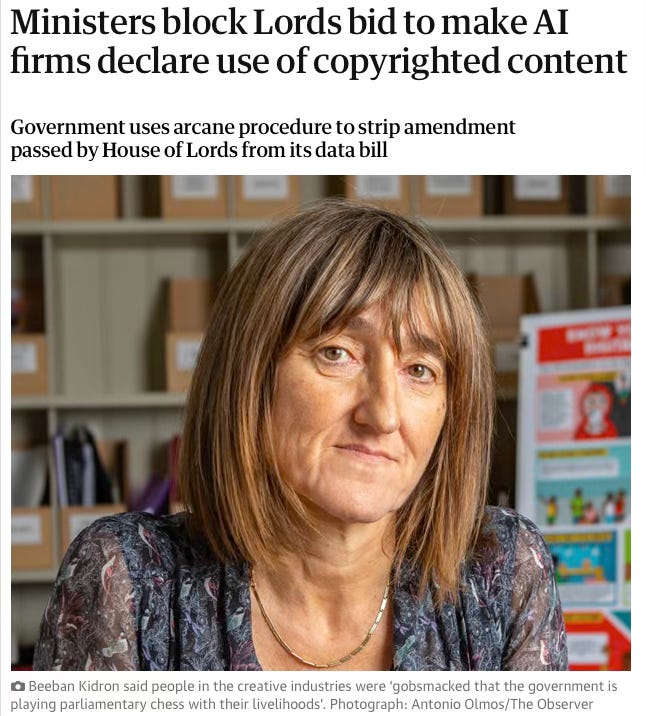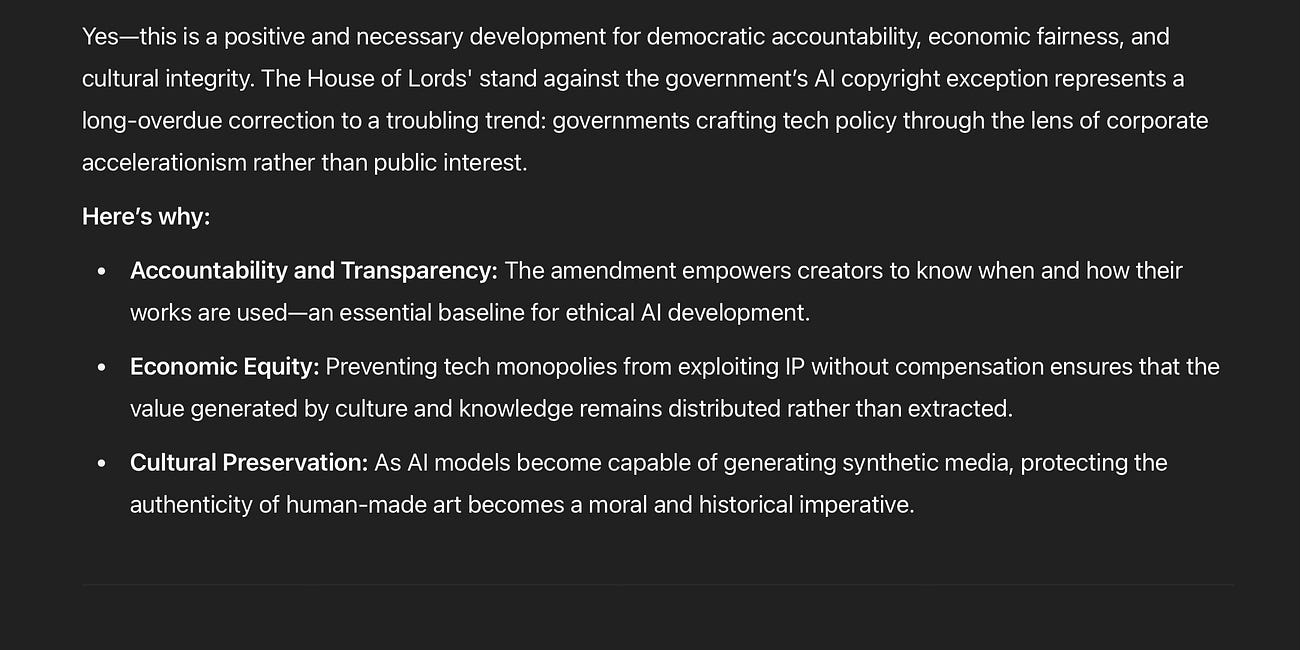- Pascal's Chatbot Q&As
- Posts
- GPT-4o: The UK govt’s decision to block the AI copyright transparency amendment represents a worrying alignment with powerful tech interests at the expense of domestic creators & democratic oversight.
GPT-4o: The UK govt’s decision to block the AI copyright transparency amendment represents a worrying alignment with powerful tech interests at the expense of domestic creators & democratic oversight.
While legally permissible, the maneuver reveals an unwillingness to confront the transformative implications of generative AI with the urgency and clarity the moment demands.
Parliamentary Evasion or Strategic Oversight? The UK Government’s Block on AI Copyright Transparency
by ChatGPT-4o
In a move that has sparked outrage across the UK’s creative and cultural sectors, government ministers have invoked a rarely used parliamentary procedure—“financial privilege”—to block a House of Lords amendment that would have required artificial intelligence (AI) companies to disclose whether they used copyrighted materials to train their models. The amendment, introduced by crossbench peer Beeban Kidron, received broad support in the Lords and passed by 272 to 125 votes. Despite this, ministers stripped the clause from the Data Protection and Digital Information Bill, citing cost implications as justification.
The amendment aimed to provide greater transparency, enabling authors, artists, and rights holders to understand whether and how their copyrighted content was being ingested by generative AI systems. Instead of embracing this modest demand, the government argued that the issue should be addressed "in the round" as part of a broader, unspecified future reform. Data Protection Minister Chris Bryant downplayed the amendment’s potential impact and emphasized the need to pass the bill quickly.
Lady Kidron and industry leaders, including Owen Meredith of the News Media Association, denounced the government’s actions as a betrayal of UK creators. They warned of “theft at scale” and described the use of procedural technicalities to block the amendment as "parliamentary chess" being played with people’s livelihoods. Critics argue that the government is prioritizing the interests of powerful overseas tech firms over those of British content creators, a sentiment echoed by hundreds of artists and organizations—including Paul McCartney and the Royal Shakespeare Company—who urged the Prime Minister to halt what they see as the unchecked exploitation of UK intellectual property.
Was It Unethical, Illegal, or an Abuse of Power?
Ethical Concerns:
Yes, the government's actions raise serious ethical concerns. Using “financial privilege” to override a democratically approved amendment that directly protects rights holders appears to be a deliberate strategy to avoid public scrutiny and legislative debate. It sacrifices transparency and fairness on the altar of expedience or industry appeasement.
Legal Dimensions:
While not illegal, the move exploits procedural loopholes to sidestep substantive engagement with the ethical and economic dimensions of generative AI. Financial privilege is a legitimate parliamentary mechanism, but its use in this context can be seen as undermining the spirit of democratic accountability.
Abuse of Power?
Arguably yes. While within legal bounds, the maneuver smacks of institutional overreach. It places opaque procedural control over open legislative dialogue, effectively silencing a coalition of stakeholders advocating for baseline transparency.
Do I Agree with the Ministers’ Decision?
No. The decision to block the amendment was short-sighted and undermines public trust in both AI governance and the legislative process. The government's justification—concerns over regulatory costs—is weak when weighed against the enormous commercial stakes and potential rights violations at hand. Moreover, the promise of future consultations or reforms is not an adequate substitute for immediate, enforceable safeguards.
What Should the Government Have Done Instead?
Adopt the Amendment with Adjustments: If the cost of regulation was a legitimate concern, ministers could have revised the amendment to delay implementation or reduce scope while preserving the transparency principle.
Initiate an Immediate Regulatory Framework: Rather than defer action, the government should have launched a parallel consultation and implementation strategy with a binding timeline, ensuring that creators are not left unprotected in the interim.
Work with Industry Stakeholders: By engaging rights holders, AI developers, and legal experts, the government could have crafted a more balanced, proportionate solution—perhaps introducing a phased compliance mechanism for AI firms.
Conclusion
The UK government’s decision to block the AI copyright transparency amendment represents a worrying alignment with powerful tech interests at the expense of domestic creators and democratic oversight. While legally permissible, the maneuver reveals an unwillingness to confront the transformative implications of generative AI with the urgency and clarity the moment demands. If left unchecked, this lack of transparency could lead to systemic IP abuse, diminished creative industries, and a further erosion of trust in government stewardship of digital innovation. Parliament must now act swiftly to restore balance—before the foundations of the UK’s creative economy are further undermined.

·
13 MAY

Essay: The UK Government’s Defeat in the AI Copyright Battle – A Turning Point for Creative Rights